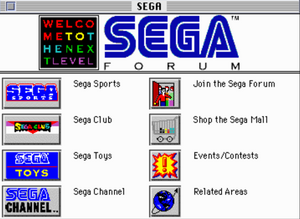Difference between revisions of "Sega Forum"
From Sega Retro
| Line 2: | Line 2: | ||
{{stub}}'''Sega Forum''' was [[Sega of America]]'s online presence available through the CompuServe network. It opened in November 1994{{intref|Press release: 1994-11-02: Sega goes on-line with CompuServe & World Wide Web}} as an early means of online communcation between Sega and its customers and could be accessed by visiting "GO SEGA". Sega was one of the first video game publishers to offer such a service, and one of the few to maintain both a CompuServe forum and a World Wide Web website at the same time (the latter opening mere days later). | {{stub}}'''Sega Forum''' was [[Sega of America]]'s online presence available through the CompuServe network. It opened in November 1994{{intref|Press release: 1994-11-02: Sega goes on-line with CompuServe & World Wide Web}} as an early means of online communcation between Sega and its customers and could be accessed by visiting "GO SEGA". Sega was one of the first video game publishers to offer such a service, and one of the few to maintain both a CompuServe forum and a World Wide Web website at the same time (the latter opening mere days later). | ||
| − | Sega offered a "stream" of meetings through the Sega Forum across 1994, starting with a presentation with [[Tom Kalinske]] on 7th November, [[Roger Hector]] on the 15th, [[Joe Miller]] on the 18th and the developers behind the [[Sega 32X]] version of ''[[Doom]]'' on the 30th{{intref|Press release: 1994-11-02: Sega goes on-line with CompuServe & World Wide Web}}. It also offered details of games (and toys) and a means of purchasing rare items | + | Sega offered a "stream" of meetings through the Sega Forum across 1994, starting with a presentation with [[Tom Kalinske]] on 7th November, [[Roger Hector]] on the 15th, [[Joe Miller]] on the 18th and the developers behind the [[Sega 32X]] version of ''[[Doom]]'' on the 30th{{intref|Press release: 1994-11-02: Sega goes on-line with CompuServe & World Wide Web}}. It also offered details of games (and toys), the [[Sega Channel]] schedule, and a means of purchasing rare items online. |
Very little from this service has survived, though it is known to have kept operating into at least 1998. As with most things CompuServe-related, the World Wide Web alternative proved to be the more popular platform, and would become the dominant means of accessing Sega content via the internet. | Very little from this service has survived, though it is known to have kept operating into at least 1998. As with most things CompuServe-related, the World Wide Web alternative proved to be the more popular platform, and would become the dominant means of accessing Sega content via the internet. | ||
Revision as of 09:34, 15 November 2024
This short article is in need of work. You can help Sega Retro by adding to it.
Sega Forum was Sega of America's online presence available through the CompuServe network. It opened in November 1994[1] as an early means of online communcation between Sega and its customers and could be accessed by visiting "GO SEGA". Sega was one of the first video game publishers to offer such a service, and one of the few to maintain both a CompuServe forum and a World Wide Web website at the same time (the latter opening mere days later).
Sega offered a "stream" of meetings through the Sega Forum across 1994, starting with a presentation with Tom Kalinske on 7th November, Roger Hector on the 15th, Joe Miller on the 18th and the developers behind the Sega 32X version of Doom on the 30th[1]. It also offered details of games (and toys), the Sega Channel schedule, and a means of purchasing rare items online.
Very little from this service has survived, though it is known to have kept operating into at least 1998. As with most things CompuServe-related, the World Wide Web alternative proved to be the more popular platform, and would become the dominant means of accessing Sega content via the internet.
While not restricted to North America, the US was the only country where the Sega Forum was advertised, with its contents tailored for an American audience. Unlike its website, no localised versions if the Sega Forum were ever produced.
Magazine articles
- Main article: Sega Forum/Magazine articles.






